
Cyberpunk is a subgenre of science fiction in a dystopian futuristic setting said to focus on a combination of "low-life and high tech". It features futuristic technological and scientific achievements, such as artificial intelligence and cyberware, juxtaposed with societal collapse, dystopia or decay. Much of cyberpunk is rooted in the New Wave science fiction movement of the 1960s and 1970s, when writers like Philip K. Dick, Michael Moorcock, Roger Zelazny, John Brunner, J. G. Ballard, Philip José Farmer and Harlan Ellison examined the impact of drug culture, technology, and the sexual revolution while avoiding the utopian tendencies of earlier science fiction.

Kevin Wayne Jeter is an American science fiction and horror author known for his literary writing style, dark themes, and paranoid, unsympathetic characters. He has written novels set in the Star Trek and Star Wars universes, and has written three sequels to Blade Runner. Jeter coined the term "steampunks".
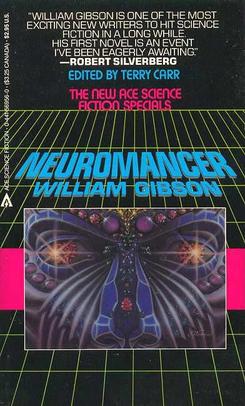
Neuromancer is a 1984 science fiction novel by American-Canadian writer William Gibson. Considered one of the earliest and best-known works in the cyberpunk genre, it is the only novel to win the Nebula Award, the Philip K. Dick Award, and the Hugo Award. It was Gibson's debut novel and the beginning of the Sprawl trilogy. Set in the future, the novel follows Henry Case, a washed-up hacker hired for one last job, which brings him in contact with a powerful artificial intelligence.

Philip Kindred Dick, often referred to by his initials PKD, was an American science fiction writer and novelist. He wrote 44 novels and about 121 short stories, most of which appeared in science fiction magazines during his lifetime. His fiction explored varied philosophical and social questions such as the nature of reality, perception, human nature, and identity, and commonly featured characters struggling against elements such as alternate realities, illusory environments, monopolistic corporations, drug abuse, authoritarian governments, and altered states of consciousness. He is considered one of the most important figures in 20th-century science fiction.

Do Androids Dream of Electric Sheep? is a 1968 dystopian science fiction novel by American writer Philip K. Dick. It is set in a post-apocalyptic San Francisco, where Earth's life has been greatly damaged by a nuclear global war, leaving most animal species endangered or extinct. The main plot follows Rick Deckard, a bounty hunter who has to "retire" six escaped Nexus-6 model androids, while a secondary plot follows John Isidore, a man of sub-par IQ who aids the fugitive androids.

Timothy Thomas Powers is an American science fiction and fantasy author. His first major novel was The Drawing of the Dark (1979), but the novel that earned him wide praise was The Anubis Gates (1983), which won the Philip K. Dick Award, and has since been published in many other languages. His other written work include Dinner at Deviant's Palace (1985), Last Call (1992), Expiration Date (1996), Earthquake Weather (1997), Declare (2000), and Three Days to Never (2006). Powers has won the World Fantasy Award twice for his critically acclaimed novels Last Call and Declare. His 1987 novel On Stranger Tides served as inspiration for the Monkey Island franchise of video games and was partly adapted into the fourth Pirates of the Caribbean film.
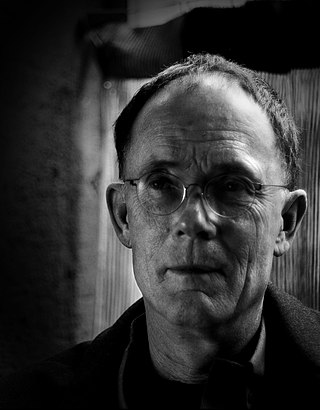
William Ford Gibson is an American-Canadian speculative fiction writer and essayist widely credited with pioneering the science fiction subgenre known as cyberpunk. Beginning his writing career in the late 1970s, his early works were noir, near-future stories that explored the effects of technology, cybernetics, and computer networks on humans, a "combination of lowlife and high tech"—and helped to create an iconography for the Information Age before the ubiquity of the Internet in the 1990s. Gibson coined the term "cyberspace" for "widespread, interconnected digital technology" in his short story "Burning Chrome" (1982), and later popularized the concept in his acclaimed debut novel Neuromancer (1984). These early works of Gibson's have been credited with "renovating" science fiction literature in the 1980s.

The Man in the High Castle (1962), by Philip K. Dick, is an alternative history novel wherein the Axis Powers won World War II. The story occurs in 1962, fifteen years after the end of the war in 1947, and depicts the life of several characters living under Imperial Japan or Nazi Germany as they rule a partitioned United States. The titular character is the mysterious author of a novel-within-the-novel entitled The Grasshopper Lies Heavy, a subversive alternative history of the war in which the Allied Powers are victorious.
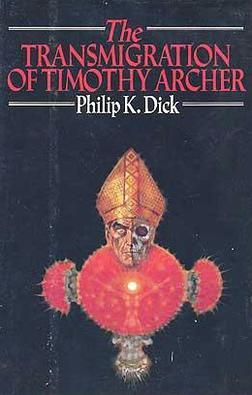
The Transmigration of Timothy Archer is a 1982 novel by American writer Philip K. Dick. As his final work, the book was published shortly after his death in March 1982, although it was written the previous year.

Flow My Tears, the Policeman Said is a 1974 science fiction novel by American writer Philip K. Dick. The novel is set in a futuristic dystopia where the United States has become a police state in the aftermath of a Second American Civil War. The story follows genetically enhanced pop singer and television star Jason Taverner who wakes up in a world where he has never existed.

Richard Kingsley Morgan, is a British science fiction and fantasy author of books, short stories, and graphic novels. He is the winner of the Philip K. Dick Award for his 2003 book Altered Carbon, which was adapted into a Netflix series released in 2018. His third book, Market Forces, won the John W. Campbell Award in 2005, while his 2008 work Thirteen garnered him the Arthur C. Clarke Award.

Altered Carbon is a 2002 British cyberpunk novel by the English writer Richard K. Morgan. Set in a future in which interstellar travel and relative immortality is facilitated by transferring consciousnesses between bodies ("sleeves"), it follows the attempt of Takeshi Kovacs, a former U.N. elite soldier turned private investigator, to investigate a rich man's death. It is followed by the sequels Broken Angels and Woken Furies.
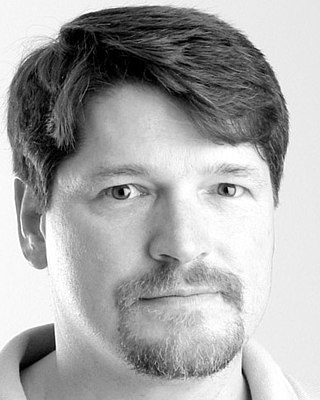
Bruce Bethke is an American author best known for his 1983 short story "Cyberpunk" which led to the widespread use of the term for the cyberpunk subgenre of science fiction. His novel, Headcrash, won the Philip K. Dick Award in 1995 for SF original paperback published in the US.

Ian McDonald is a British science fiction novelist, living in Belfast. His themes include nanotechnology, postcyberpunk settings, and the impact of rapid social and technological change on non-Western societies.
Since the advent of the cyberpunk genre, a number of cyberpunk derivatives have become recognized in their own right as distinct subgenres in speculative fiction, especially in science fiction. Rather than necessarily sharing the digitally and mechanically focused setting of cyberpunk, these derivatives can display other futuristic, or even retrofuturistic, qualities that are drawn from or analogous to cyberpunk: a world built on one particular technology that is extrapolated to a highly sophisticated level, a gritty transreal urban style, or a particular approach to social themes.
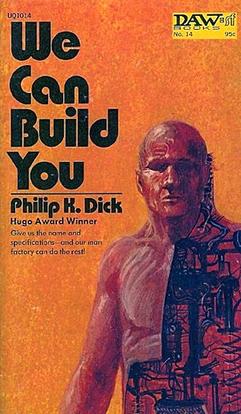
We Can Build You is a 1972 science fiction novel by American writer Philip K. Dick. Written in 1962 as The First in Our Family, it remained unpublished until appearing in serial form as A. Lincoln, Simulacrum in the November 1969 and January 1970 issues of Amazing Stories magazine, re-titled by editor Ted White. The novel was issued as a mass market paperback original by DAW Books in 1972, its final title provided by publisher Donald A. Wollheim. Its first hardcover edition was published in Italy in 1976, and Vintage issued a trade paperback in 1994.
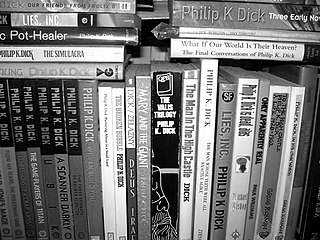
The bibliography of Philip K. Dick includes 44 novels, 121 short stories, and 14 short story collections published by American science fiction author Philip K. Dick during his lifetime.

Dr. Adder is a dark science fiction novel by American writer K. W. Jeter, set in a future where the United States has largely broken down into reluctantly cooperating enclaves run by a wide variety of strongmen and warlords, with a veneer of government control that seems largely interested in controlling technology. Dr. Adder is an artist-surgeon, who modifies sexual organs of his patients to satisfy the weirdest of perversion; he is clearly depicted as a partly criminal, partly counter-cultural figure in a future Los Angeles. The novel anticipates various cyberpunk ideas that would be established by the Sprawl trilogy written by William Gibson, as well as other works of that science fiction genre.
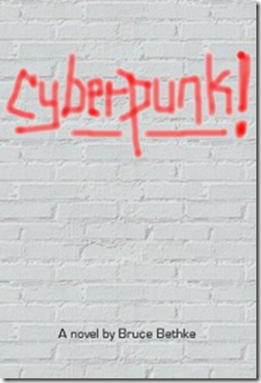
"Cyberpunk" is a 1983 science fiction short story by Bruce Bethke, published in Amazing Stories. Bethke subsequently expanded the story into a novel and made it available online in 2001. The story is most famous for coining the term "cyberpunk", which came to be used to describe the science fiction subgenre featuring rebellious use of technology.


















